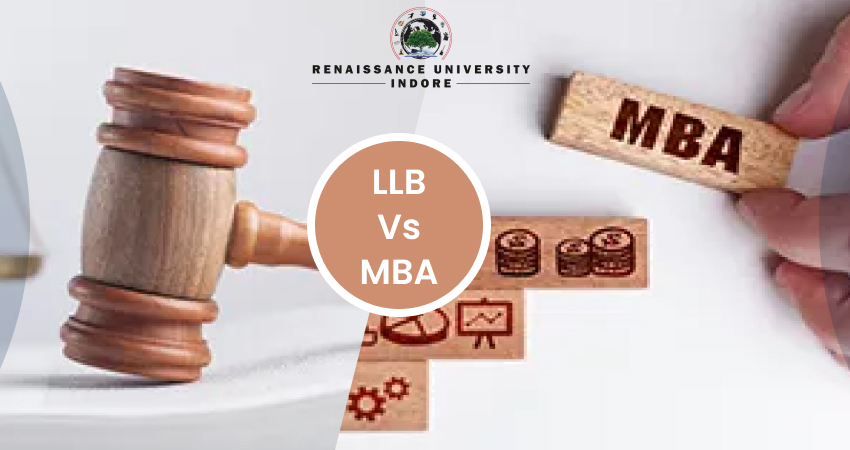Choosing the right educational path is a pivotal decision that can shape the course of your career and life. For those torn between the realms of law and business, the dilemma often boils down to LLB (Bachelor of Laws) and MBA (Master of Business Administration). Both degrees offer unique perspectives, skill sets, and career trajectories. In this exploration, we delve into the intricacies of LLB and MBA to help you navigate the crossroads and make an informed decision.
Lawyers make up the largest group of professionals in India. They are also the most sought-after professionals in the country. So, it is not surprising that a large number of students aspire to be lawyers.
In recent years, however, there has been an increase in the number of aspirants for MBA courses. This has led to a debate on whether LLB or MBA is better for career growth and financial stability.
This article will highlight some key differences between LLB and MBA so that you can decide which course is best suited for you.
Overview
A LLB is a three-year undergraduate degree that provides students with a strong foundation in the principles of law and legal practice. Students are able to study a range of subjects, including criminal law, constitutional law and international law.
An MBA is a postgraduate degree that provides students with an understanding of business management, finance and marketing. Students are able to study subjects such as marketing strategy, business economics and financial accounting.
Understanding LLB:
LLB, or Bachelor of Laws, is a degree that focuses on the study of law and legal systems. Pursuing LLB equips students with a comprehensive understanding of legal principles, statutes, and case law. The curriculum typically covers subjects such as contract law, criminal law, constitutional law, and more. Law schools emphasize critical thinking, analytical skills, and the ability to interpret complex legal texts.
Understanding MBA:
MBA, or Master of Business Administration, is a postgraduate degree that focuses on developing managerial and business skills. The curriculum covers a broad range of subjects, including finance, marketing, operations, and strategic management. MBA programs emphasize leadership, decision-making, and a holistic understanding of business dynamics.
LLB vs MBA – Eligibility Criteria
| Criteria | LLB | MBA |
|---|---|---|
| Full-form | Bachelor of Law | Master of Business Administration |
| Duration | 3 Years | 2 Years |
| Eligibility criteria | Graduation (Any stream) with a minimum 50% aggregate | Graduation (Any stream) with a minimum 45% aggregate |
| Average Fee | INR 1.5 LPA | INR 5 LPA |
| Average Salary | INR 5 – 8 LPA | INR 5 – 10 LPA |
LLB –
The LLB degree is a three-year long undergraduate course in law. The course is offered by the universities and colleges in India and abroad. The eligibility criteria for LLBs are as follows:
- A candidate must have passed a 10+2 or equivalent exam with English as one of the subjects.
- A candidate must have cleared the entrance exam with a minimum rank that varies from state to state.
An MBA degree is a two-year long postgraduate course in business management. The course is offered by the universities and colleges in India and abroad.
This course is offered by the Renaissance Universities and colleges in India. This course is divided into six semesters; each semester has to be completed before the next semester can be started. The courses that are offered in this program include Constitutional Law, Criminal Law, Administrative Law, Company law, Taxation law and international law.
List of top law entrance exams 2023 in India
- CLAT
- AILET
- LSAT India
- DU LLB
- MHCET Law
- TS LAWCET and more.
MBA –
The eligibility criteria for MBA is a set of prerequisites which are required to be eligible for MBA. The eligibility criteria vary from one institute to another and also depend on the course or specialization that is chosen by the candidate.
Eligibility criteria can be broadly classified into two categories:
1) Academic Criteria
2) Non-Academic Criteria
Entrance exams are one of the most important factors in determining which colleges you will apply to for higher education. Most universities require applicants to take the SAT or ACT test followed by an entrance exam for the specific college program applied for.
There are 9 popular National Level MBA entrance exams in India for MBA admission:
- CAT
- CMAT
- MAT
- XAT
- NMAT
- SNAP
- ATMA
- GMAT
Advantages of Pursuing LLB
Legal Expertise:
An LLB degree provides in-depth knowledge of the legal framework, making graduates adept at navigating the intricacies of the law. This expertise is not limited to understanding laws but extends to interpreting them, applying legal reasoning, and finding solutions within the confines of the legal system.
Advocacy Skills:
LLB programs often hone communication and argumentation skills, crucial for success in legal practice. The ability to articulate thoughts persuasively and construct compelling arguments is an invaluable skill for courtroom proceedings, negotiations, and legal consultations.
Diverse Career Paths:
Graduates can pursue diverse career paths, including private practice, corporate law, public service, and even academia. Whether representing clients in court, advising businesses on legal matters, or shaping public policy, the LLB opens doors to a multitude of rewarding careers.
Social Impact:
Law has the power to bring about societal change, and many individuals choose LLB to make a positive impact on justice and legal systems. From championing human rights to advocating for environmental sustainability, legal professionals can actively contribute to social causes.
Advantages of Pursuing MBA
Business Acumen:
MBA graduates develop a strong business acumen, enabling them to understand the complexities of the corporate world. From financial analysis to market research, MBA programs provide a comprehensive overview of business functions, fostering a strategic mindset essential for managerial roles.
Versatility:
The skills acquired during an MBA program are applicable across industries, allowing graduates to pursue careers in various sectors. Whether in finance, healthcare, technology, or non-profit organizations, the versatility of an MBA degree empowers individuals to adapt to different professional environments.
Networking Opportunities:
MBA programs often provide extensive networking opportunities, connecting students with industry professionals and potential employers. Building a robust professional network is a key advantage for MBA graduates, as it opens doors to job opportunities, collaborations, and even entrepreneurial ventures.
Entrepreneurial Edge:
Many successful entrepreneurs hold MBA degrees, as the program equips individuals with the skills needed to start and manage their own businesses. From developing business plans to understanding market trends, the entrepreneurial edge gained through an MBA can be a catalyst for launching and sustaining a successful business.
LLB – Skills to Excel
There is a lot of competition in the job market. In order to excel and stand out among the crowd, you need to have some skills that are rare and valuable.
Some of these skills are:
- Communication skills
- Teamwork skills
- Leadership Skills
- Creativity Skills
- Empathy and Compassion
- Communication Skills
- Decision Making Skills
- Honesty and Trustworthiness
MBA – Skills to excel
MBA graduates are in high demand in the job market because of the skills they can bring to the table.
- The skills that employers look for are
- leadership, analytical thinking,
- problem solving.
- Communication.
- Teamwork skills
The MBA degree is a gateway to high paying jobs and a great way to make a difference in the world.
Almost both courses require similar types of skills to excel in the career, but few are specific as per the course requirements.
MBA Career Opportunities
The world of business is constantly changing and evolving. The MBA degree provides students with the skills and knowledge to be able to adapt to this change.
The MBA degree prepares students for a variety of different careers in the business world. Students can choose from a wide range of disciplines, including finance, marketing, operations management, human resources, entrepreneurship and general management.
- Corporate Management:
- Roles: Chief Executive Officer (CEO), Chief Operations Officer (COO), Chief Financial Officer (CFO), General Manager.
- Responsibilities: Overseeing business operations, formulating strategies, financial management, and leading teams.
- Marketing and Brand Management:
- Roles: Marketing Manager, Brand Manager, Digital Marketing Specialist.
- Responsibilities: Developing marketing strategies, conducting market research, building brand awareness, and managing advertising campaigns.
- Finance and Banking:
- Roles: Financial Analyst, Investment Banker, Chief Financial Officer (CFO).
- Responsibilities: Financial analysis, investment planning, risk management, and overseeing financial operations.
- Entrepreneurship:
- Roles: Founder, Entrepreneur, Business Owner.
- Responsibilities: Planning and launching new ventures, managing business operations, and strategic decision-making.
- Consulting:
- Roles: Management Consultant, Strategy Consultant.
- Responsibilities: Advising businesses on strategy, operations, and organizational improvements.
- Human Resources:
- Roles: HR Manager, Talent Acquisition Specialist.
- Responsibilities: Recruitment, employee relations, talent management, and organizational development.
- Information Technology Management:
- Roles: IT Manager, Chief Information Officer (CIO).
- Responsibilities: Overseeing IT infrastructure, managing technology projects, and ensuring data security.
- Supply Chain Management:
- Roles: Supply Chain Manager, Logistics Manager.
- Responsibilities: Optimizing supply chain processes, inventory management, and logistics coordination.
- Healthcare Management:
- Roles: Healthcare Administrator, Hospital Manager.
- Responsibilities: Managing healthcare facilities, budgeting, and implementing organizational policies.
- International Business:
- Roles: International Business Manager, Global Operations Manager.
- Responsibilities: Managing business operations on a global scale, dealing with international markets and trade.
LLB Career Opportunities
There are a number of LLB career opportunities that one can explore. The best part is that you can choose from a variety of careers.
Lawyers:
These lawyers work in the courts and advise clients on legal matters. They often work in law firms or public service offices. Legal professionals: These professionals are not lawyers, but they have to deal with legal matters as well. They often work in government agencies, non-profit organizations, or private companies.
Administration:
These professionals offer administrative support to lawyers and other legal professionals. They may also be involved with research, teaching, and publishing legal information for the public.
Law librarians:
These professionals are responsible for providing access to law libraries and resources for the public as well as provide assistance to those who need it at the library itself.
- Private Practice:
- Roles: Attorney, Lawyer, Legal Counsel.
- Responsibilities: Representing clients in court, providing legal advice, drafting legal documents.
- Corporate Law:
- Roles: Corporate Counsel, In-House Legal Advisor.
- Responsibilities: Advising businesses on legal matters, drafting contracts, and ensuring legal compliance.
- Criminal Law:
- Roles: Defense Attorney, Prosecutor.
- Responsibilities: Representing clients in criminal cases, prosecuting or defending individuals accused of crimes.
- Family Law:
- Roles: Family Lawyer, Divorce Attorney.
- Responsibilities: Handling legal matters related to family issues, such as divorce, child custody, and adoption.
- Environmental Law:
- Roles: Environmental Lawyer, Sustainability Consultant.
- Responsibilities: Addressing legal issues related to environmental regulations, advising on sustainable practices.
- Intellectual Property Law:
- Roles: Patent Attorney, Trademark Lawyer.
- Responsibilities: Protecting intellectual property rights, including patents, trademarks, and copyrights.
- Human Rights Law:
- Roles: Human Rights Lawyer, Advocacy Specialist.
- Responsibilities: Working to protect and promote human rights, often in collaboration with non-profit organizations.
- Real Estate Law:
- Roles: Real Estate Attorney, Property Law Specialist.
- Responsibilities: Handling legal aspects of real estate transactions, resolving property disputes.
- Government and Public Service:
- Roles: Public Defender, Government Attorney.
- Responsibilities: Providing legal counsel to government agencies, representing the government in legal matters.
- Legal Academia:
- Roles: Law Professor, Legal Researcher.
- Responsibilities: Teaching law, conducting legal research, and contributing to legal scholarship.
LLB vs MBA – Salary Packages
This article is about the difference between LLB and MBA degrees, their salary packages, and other benefits.
A postgraduate degree in law or business management is a typical route to higher education. It takes two years to complete an LLB or MBA degree respectively. And the differences between these two degrees are significant.
An LLB is a more general degree that covers all areas of law, while an MBA focuses on business management and marketing. An MBA also includes more training in soft skills like leadership, teamwork, and people management.
- The minimum salary after MBA is Rs. 5,00,000 per annum.
- The minimum salary after LLB is Rs. 3,00000 per annum.
The salary packages are not the same for all the industries. The salary packages will depend on the industry, company size and location.
LLB or MBA: Which is Tough?
While both MBA and LLB programs present their unique challenges, determining which is “tougher” depends on individual strengths, preferences, and career goals.
MBA may be tougher if:
- You thrive in a dynamic, fast-paced business environment.
- You enjoy solving complex problems and making strategic decisions.
- You are comfortable with a competitive academic setting.
LLB may be tougher if:
- You have a passion for legal theory and a commitment to justice.
- You excel in analytical thinking and attention to detail.
- You appreciate the significance of research and precise communication in legal practice.
Can You Do Law after MBA?
Getting both an MBA and a law degree can be a pretty cool combo. It means you’re not just good with business stuff but also know your way around legal matters. This dual skill set can make you super useful in jobs where business and law mix. Even though business and law are different, they’re kind of like buddies. The skills you pick up in an MBA – like figuring out problems, making smart decisions, and being a good thinker – come in handy when you’re dealing with law things. Plus, the talking and negotiating skills you learn can be super useful as a lawyer.
With both an MBA and a law degree, you can open the door to lots of different jobs. You could work in a law firm that helps businesses, making sure they follow the rules and sort out contracts. Or, you might end up in a big company, using your legal smarts to help them make good choices.
So, can you do law after an MBA? Absolutely! It’s a smart move if you want a job that mixes business and law. Just know it’s not all easy – you’ll need to put in the work. But hey, with the right mix of skills, you could be that awesome pro who knows how to handle both the business and legal sides of things.
Who Earns More MBA or Lawyer?
Both MBAs and lawyers can earn lucrative salaries in India, but on average, MBAs tend to make more over the course of their careers. Right after graduation, lawyers often start out earning more as they begin working at law firms or starting their own practices. However, over time, MBAs have the potential to advance more quickly into higher paying management and executive positions in major corporations. For example, senior partners at top Indian law firms may earn around 1-2 crore rupees per year, while MBAs can rise to positions like CEO with total compensation packages worth 3-4 crores or higher. The pay ceiling tends to be higher for MBAs at the very top companies. However, there is also more income stability and job security overall for lawyers. Both career paths offer relatively high earnings potential, but MBAs see faster salary growth to overtake lawyers during mid-career stages. With India’s economic expansion, demand for both high-quality legal and business management skills is likely to remain strong.
LLB or MBA – Which One to Choose?
Law and business are two different degrees with different career paths. It is difficult to say which one is better as they both have their own advantages. LLB, in general, gives a more thorough understanding of the law and how it applies to various areas of law, while MBA focuses on the financial side of the business.
If you are passionate about justice, enjoy legal research, and have excellent communication skills, LLB might be the right path for you. On the other hand, if you are intrigued by business dynamics, aspire to lead teams, and want a versatile skill set applicable across industries, an MBA could be your ideal choice. Careful consideration of your interests and aspirations will guide you toward the path that aligns with your vision for a successful and fulfilling career. Remember, both LLB and MBA offer unique journeys, and the best choice is the one that aligns with your professional aspirations and personal fulfillment.






